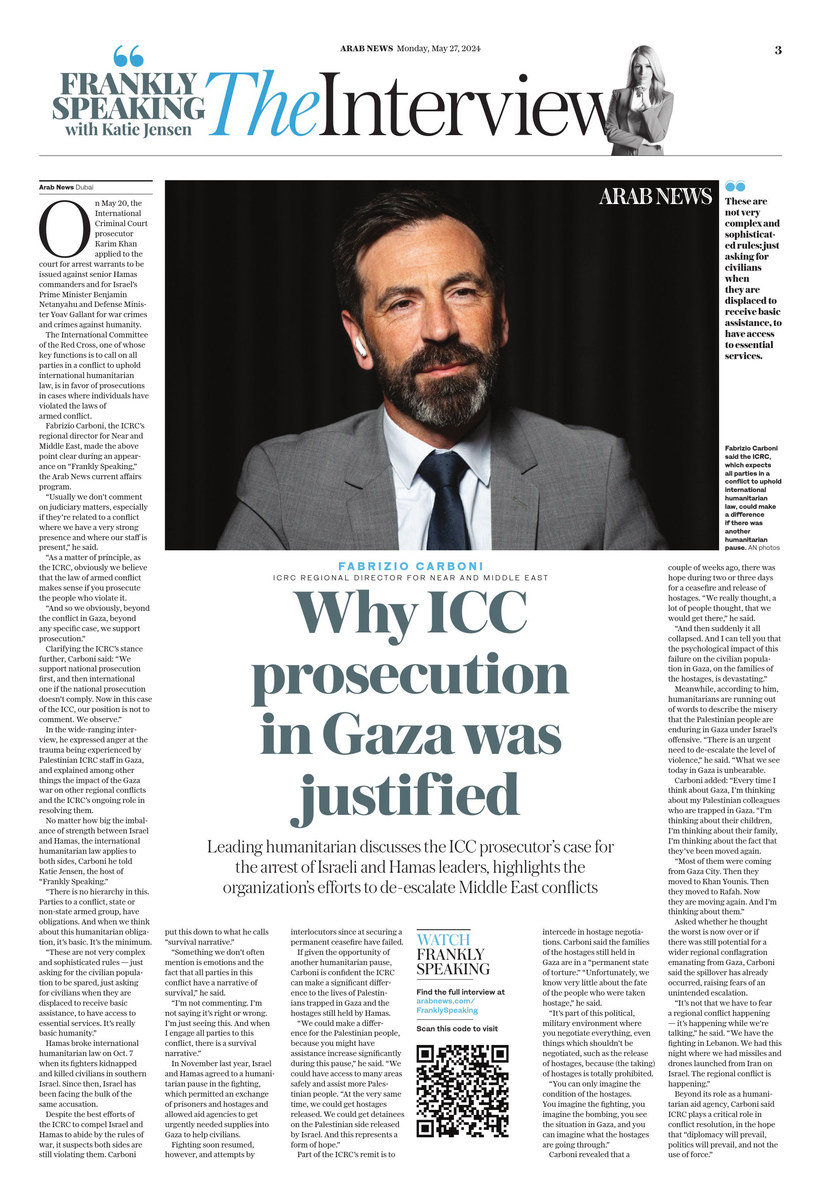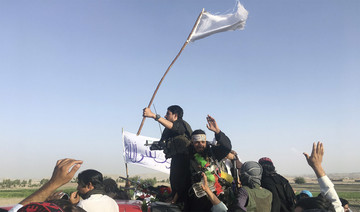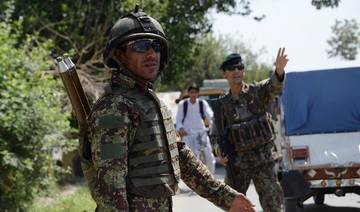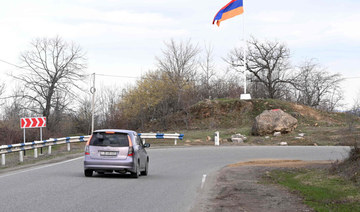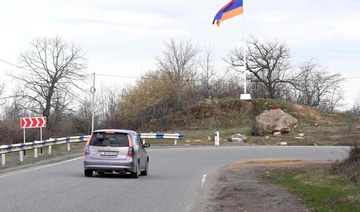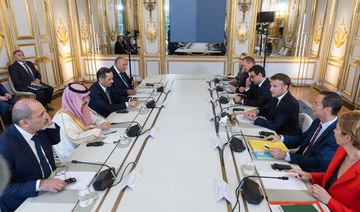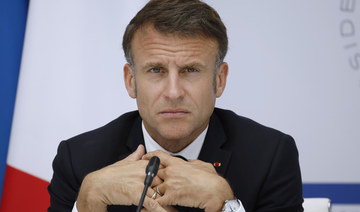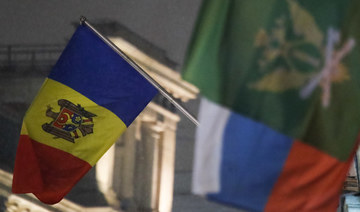KABUL, Afghanistan: Afghan officials say security forces have pushed back the Taliban from Ghazni and are now trying to flush the insurgents from the city’s outskirts.
The operations come on the fifth day after a massive Taliban attack on the provincial capital of Ghazni.
Hundreds of people have fled the fighting in Ghazni, which has killed about 100 members of the Afghan security forces and at least 20 civilians.
Nasart Rahimi, a deputy spokesman at the Interior Ministry, says security forces were searching every inch of Ghazni for Taliban fighters on Tuesday.
Abdul Karim Arghandiwal, an army media officer in southeastern Afghanistan, says military helicopters are supporting the ground forces’ operations in Ghazni.
Taliban spokesman Zabihullah Mujahid denies the insurgents have been routed from Ghazni and says sporadic gunbattles are still ongoing.
Officials: Afghan forces push back Taliban from key city
Officials: Afghan forces push back Taliban from key city
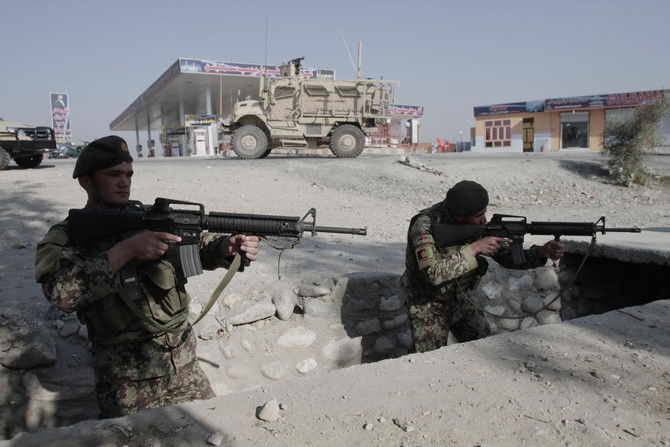
- The operations come on the fifth day after a massive Taliban attack on the provincial capital of Ghazni
- Taliban spokesman Zabihullah Mujahid denies the insurgents have been routed from Ghazni and says sporadic gunbattles are still ongoing
Armenians throng center of the capital to demand the prime minister’s resignation
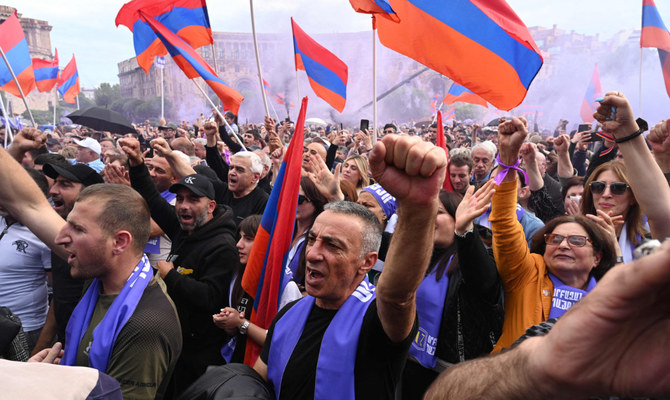
- Movement leaders told the rally Sunday that they support Galstanyan becoming the next prime minister
YEREVAN, Armenia: Tens of thousands of demonstrators held a protest Sunday in the center of the capital of Armenia, calling for the resignation of Prime Minister Nikol Pashinyan after Armenia agreed to hand over control of several border villages to Azerbaijan.
The demonstration was the latest in a weekslong series of gatherings led by a high-ranking cleric in the Armenian Apostolic Church, Bagrat Galstanyan, archbishop of the Tavush diocese in Armenia’s northeast.
He spearheaded the formation of a movement called Tavush For The Homeland after Armenia in April agreed to cede control of four villages in the region to Azerbaijan. Although the villages were the movement’s core issue, it has expanded to express a wide array of complaints about Pashinyan and his government.
Movement leaders told the rally Sunday that they support Galstanyan becoming the next prime minister.
The decision to turn over the villages in Tavush followed the lightning military campaign in September in which Azerbaijan’s military forced ethnic Armenian separatist authorities in the Karabakh region to capitulate.
After Azerbaijan took full control of Karabakh, about 120,000 people fled the region, almost all of its ethnic Armenian population.
Ethnic Armenian fighters backed by Armenian forces had taken control of Karabakh in 1994 at the end of a six-year war. Azerbaijan regained some of the territory in fighting in 2020 that ended in an armistice that brought in a Russian peacekeeper force, which began withdrawing this year.
Pashinyan has said Armenia needs to quickly define the border with Azerbaijan to avoid a new round of hostilities.
Man accused in fiery liquid attacks on New York City subway riders

- While violent crime is rare in the city’s subway system, which serves about 3 million riders a day, some high-profile attacks this year have left some riders on edge
NEW YORK: A man set a cup of liquid on fire and tossed it at a fellow subway rider in New York City, setting the victim’s shirt ablaze and injuring him, police said Sunday.
The random attack happened on a No. 1 train in lower Manhattan on Saturday afternoon, city police said, adding that the suspect was in custody on an array of criminal charges. Authorities also charged the man in connection with a similar fiery assault on the subway in February.
The victim from Saturday, a 23-year-old man, was recovering at a hospital. He told the New York Post that he shielded his fiancee and cousin from the burning liquid and his shirt caught on fire. He said he slapped himself to put out the flames. Doctors told him he had burns on about a third of his body, he said.
“He had a cup,” the victim told the Post. “He made fire and he threw it all.”
While violent crime is rare in the city’s subway system, which serves about 3 million riders a day, some high-profile attacks this year have left some riders on edge. They include the death of a man who was shoved onto the tracks in East Harlem in March and a few shootings.
The suspect in Saturday’s assault, Nile Taylor, 49, was arrested a short time after it happened when police tracked a phone he allegedly stole from another subway rider to his location, authorities said. He was charged with assault, arson, illegal possession of a weapon and several other crimes.
It wasn’t immediately clear if Taylor had a lawyer who could respond to the allegations, or when he would be arraigned in court.
Authorities also announced on Sunday afternoon that Taylor was charged with attempted assault, reckless endangerment and arson in the February attack. Police say he threw a container with a flaming liquid at a group of people on a subway platform in the West 28th Street station. No one was injured.
Gov. Kathy Hochul in March announced that hundreds of National Guard members would be going into the subway system to boost security. City police said 800 more officers would be deployed to the subway to crack down on fare evasion.
Macron urges defense of democracy on state visit to Germany
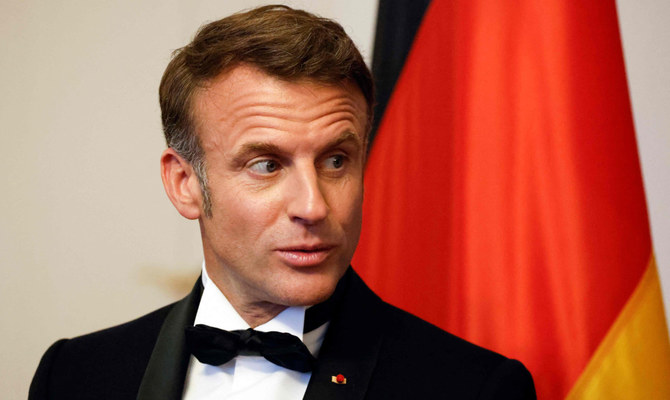
- Macron made his first stop a democracy festival in Berlin, where he warned of a “form of fascination for authoritarianism which is growing” in the two major EU nations
BERLIN: Emmanuel Macron began Sunday the first state visit to Germany by a French president in a quarter-century, bringing a plea to defend democracy against nationalism at coming European Parliament elections.
Macron made his first stop a democracy festival in Berlin, where he warned of a “form of fascination for authoritarianism which is growing” in the two major EU nations.
“We forget too often that it’s a fight” to protect democracy, Macron said, accompanied by German President Frank-Walter Steinmeier.
If nationalist parties had been in power in Europe in recent years, “history would not have been the same,” he said, pointing to decisions on the coronavirus pandemic or Russia’s invasion of Ukraine.
Steinmeier said: “We need an alliance of democrats in Europe.”
Macron “has rightly pointed out that the conditions today before the European elections are different from the previous election, a lot has happened,” he added.
The trip comes two weeks ahead of European Union elections in which polls are indicating a major potential embarrassment for Macron, with his centrist coalition trailing behind the far right.
It could even struggle to reach a third-place finish.
In Germany too, all three parties in Chancellor Olaf Scholz’s coalition are polling behind the far-right AfD in surveys, despite a series of scandals embroiling the anti-immigration party.
At a press conference, Macron said he would work to “unmask” France’s far-right National Rally (RN), saying that “nothing in their rhetoric holds water.”
“Unlike many, I’m not getting used to the idea that the National Rally is just another party. And so when it’s at the top of the surveys, I see this party and its ideas as a threat to Europe,” he said.
In a keynote address on foreign policy last month, Macron warned about the threats to Europe in the wake of Russia’s 2022 invasion of Ukraine.
“Our Europe, today, is mortal and it can die,” he said. “It can die, and this depends only on our choices.”
Ramping up his warning in Berlin, Macron urged Europeans “to go vote for the party that we back and a party that defends Europe.”
Hosting a state banquet later Sunday for Macron, Steinmeier also referred to the threat posed by Russia.
“Together we must learn again to better protect ourselves against aggressors, and to make our societies more resilient against attacks from within and without,” he said.
After the talks with Steinmeier, Macron is due to bring his message to Dresden in the former East German state of Saxony, where the AfD has a strong support base.
On Tuesday, Macron will visit the western German city of Munster and later Meseberg, outside Berlin, for talks with Scholz and a joint Franco-German cabinet meeting.
Beyond making joint appeals for the European elections, Macron’s three-day visit will seek to emphasize the historic importance of the postwar relationship between the key EU states.
France next month commemorates 80 years since the D-Day landings that marked the beginning of the end of Nazi Germany’s World War II occupation.
But all has not been smooth in a relationship often seen as the engine of the EU, and German officials are said to be uneasy at times about Macron’s perceived theatrical style of foreign policy.
Macron’s refusal to rule out sending troops to Ukraine sparked an unusually acidic response from Scholz that Germany had no such plans. Germany also does not share Macron’s enthusiasm for a European strategic autonomy less dependent on the United States.
But Macron sought to dismiss talk about discord, saying that coordination with Germany had been key over the years.
He cited agreements on sanctions against Russia over its war on Ukraine and action to spur European economic growth and innovation after the Covid pandemic.
“The Franco-German relationship is about disagreeing and trying to find ways of compromise,” said Helene Miard-Delacroix, specialist in German history at the Sorbonne university in Paris.
While Macron is a frequent visitor to Berlin, the trip is the first state visit in 24 years, since a trip by Jacques Chirac in 2000, and the sixth since the first postwar state visit by Charles de Gaulle in 1962.
Lithuania’s President Nauseda re-elected in vote marked by Russia fears
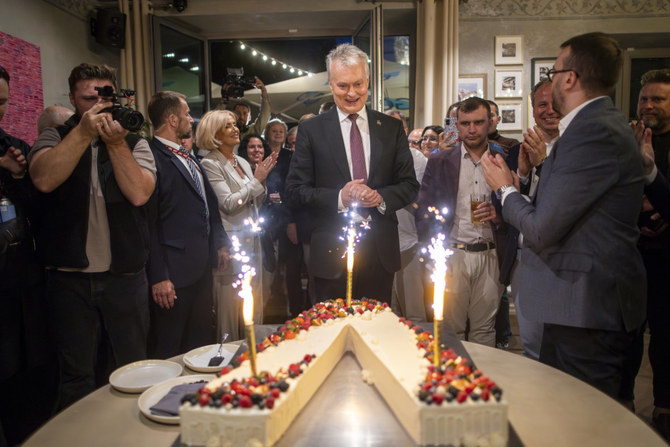
- Electoral commission count showed that Nauseda won 76 percent of votes with 80 percent of ballots counted after polls closed
- Electoral commission count showed that Nauseda won 76 percent of votes with 80 percent of ballots counted after polls closed
VILNIUS: Lithuania’s President Gitanas Nauseda won re-election on Sunday in a vote marked by defense concerns over neighboring Russia, official results showed.
The count published by the electoral commission showed that Nauseda won 76 percent of votes with 80 percent of ballots counted after polls closed in the second-round vote.
Voters “have handed me a great mandate of trust and I am well aware that I will have to cherish this,” Nauseda, 60, told journalists in Vilnius.
“Now that I have five years of experience, I believe that I will certainly be able to use this jewel properly, first of all to achieve the goals of welfare for all the people of Lithuania,” he said.
His opponent, Prime Minister Ingrida Simonyte, conceded defeat in comments to reporters and congratulated Nauseda.
The Lithuanian president steers defense and foreign policy, attending EU and NATO summits, but must consult with the government and parliament on appointing the most senior officials.
While the candidates agree on defense, they share diverging views on Lithuania’s relations with China, which have been strained for years over Taiwan.
Both candidates agree that the NATO and EU member of 2.8 million people should boost defense spending to counter the perceived threat from Russia, and to that end the government recently proposed a tax increase.
Vilnius fears it could be next in the crosshairs if Moscow were to win its war against Ukraine.
Lithuania is a significant donor to Ukraine, which has been battling Russia since the 2022 invasion. It is already a big defense spender, with a military budget equal to 2.75 percent of GDP.
It intends to purchase tanks and additional air defense systems, and to host a German brigade, as Berlin plans to complete the stationing of around 5,000 troops by 2027.
Pensioner Ausra Vysniauskiene said she voted for Nauseda.
“He’s an intelligent man, he speaks many languages, he’s educated, he’s a banker,” the 67-year-old told AFP.
“I want men to lead, especially when the threat of war is so big.”
Simonyte, the 49-year-old candidate of the ruling conservatives, was running for president again after losing to Nauseda in the last presidential ballot.
The uneasy relationship between Nauseda and Simonyte’s conservatives has at times triggered foreign policy debates, most notably on Lithuania’s relations with China.
Bilateral ties turned tense in 2021, when Vilnius allowed Taiwan to open a de facto embassy under the island’s name — a departure from the common diplomatic practice of using the name of the capital Taipei to avoid angering Beijing.
China, which considers self-ruled Taiwan a part of its territory, downgraded diplomatic relations with Vilnius and blocked its exports, leading some Lithuanian politicians to urge a restoration of relations for the sake of the economy.
Nauseda sees the need to change the name of the representative office, while Simonyte pushed back against it.
But voters also cited personal differences between the candidates, as well as economic policy and human rights.
Simonyte drew support from liberal voters in bigger cities and traditional conservative voters.
A fiscal conservative with liberal views on social issues, she notably supports same-sex partnerships, a controversial issue in the predominantly Catholic country.
“I would like to see faster progress, more openness... more tolerance for people who are different from us,” she said when casting an early vote.
Nauseda, who maintains a moderate stance on nearly all issues, has established himself as a promoter of the welfare state, with conservative views on gay rights.
Frankly Speaking: Why ICC prosecution in Gaza was justified
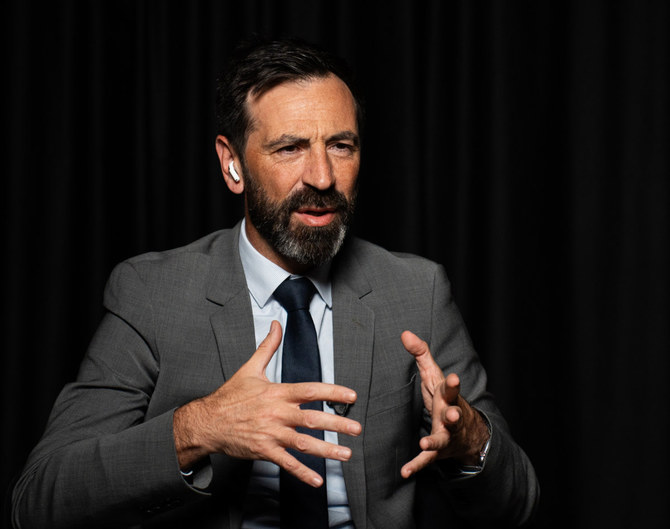
- Regional director for Near and Middle East of the International Committee of the Red Cross says the law of armed conflict makes sense if its violators are prosecuted
- Fabrizio Carboni discusses ICC prosecutor’s application for arrest warrant against Israeli’s Netanyahu and Gallant, ICRC efforts to resolve other regional conflicts
DUBAI: On May 20, the International Criminal Court prosecutor Karim Khan applied to the court for arrest warrants to be issued against senior Hamas commanders and for Israel’s Prime Minister Benjamin Netanyahu and Defense Minister Yoav Gallant for war crimes and crimes against humanity.
The International Committee of the Red Cross, one of whose key functions is to call on all parties in a conflict to uphold international humanitarian law, is in favor of prosecutions in cases where individuals have violated the laws of armed conflict.
Fabrizio Carboni, the ICRC’s regional director for Near and Middle East, made the above point clear during an appearance on “Frankly Speaking,” the Arab News current affairs program.
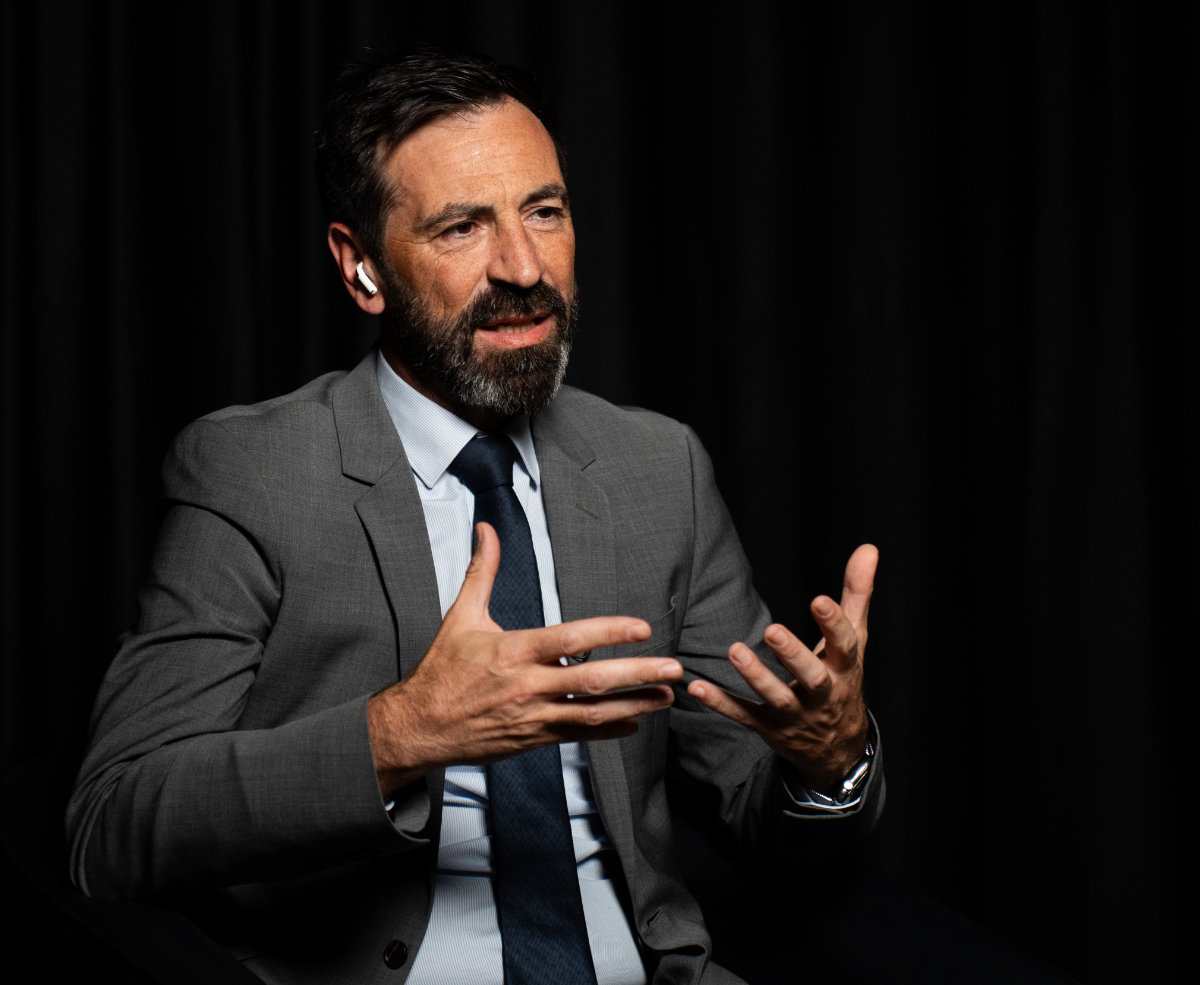
“Usually we don’t comment on judiciary matters, especially if they’re related to a conflict where we have a very strong presence and where our staff is present,” he said.
“As a matter of principle, as the ICRC, obviously we believe that the law of armed conflict makes sense if you prosecute the people who violate it.
“And so we obviously, beyond the conflict in Gaza, beyond any specific case, we support prosecution.”
He added: “We support national prosecution first, and then international one if the national prosecution doesn’t comply. Now in this case of the ICC, our position is not to comment. We observe.”
In the wide-ranging interview, Carboni expressed anger at the trauma being experienced by Palestinian ICRC staff in Gaza, and explained among other things the impact of the Gaza war on other regional conflicts and the ICRC’s ongoing role in resolving them.

No matter how big the imbalance of strength between Israel and Hamas, the international humanitarian law applies to both sides, Carboni he told Katie Jensen, the host of “Frankly Speaking.”
“There is no hierarchy in this. Parties to a conflict, state or non-state armed group, have obligations. And when we think about this humanitarian obligation, it’s basic. It’s the minimum.
“These are not very complex and sophisticated rules — just asking for the civilian population to be spared, just asking for civilians when they are displaced to receive basic assistance, to have access to essential services. It’s really basic humanity.”
Hamas broke international humanitarian law on Oct. 7 when its fighters kidnapped and killed civilians in southern Israel. Since then, Israel has been facing the bulk of the same accusation.
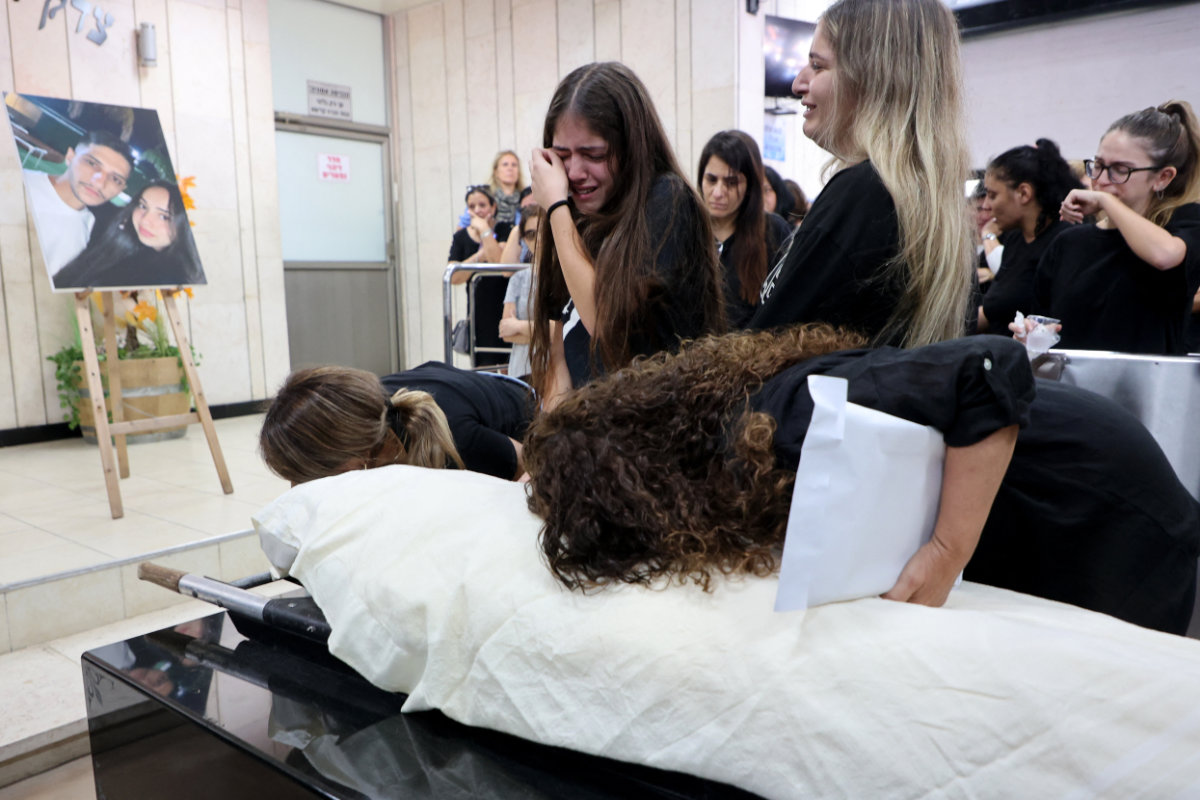
Despite the best efforts of the ICRC to compel Israel and Hamas to abide by the rules of war, it suspects both sides are still violating them. Carboni put this down to what he calls “survival narrative.”
“Something we don’t often mention is emotions and the fact that all parties in this conflict have a narrative of survival,” he said.
“I’m not commenting. I’m not saying it’s right or wrong. I’m just seeing this. And when I engage all parties to this conflict, there is a survival narrative.”
In November last year, Israel and Hamas agreed to a humanitarian pause in the fighting, which permitted an exchange of prisoners and hostages and allowed aid agencies to get urgently needed supplies into Gaza to help civilians.

Fighting soon resumed, however, and attempts by interlocutors since at securing a permanent ceasefire have failed.
If given the opportunity of another humanitarian pause, Carboni is confident the ICRC can make a significant difference to the lives of Palestinians trapped in Gaza and the hostages still held by Hamas.
“We could make a difference for the Palestinian people, because you might have assistance increase significantly during this pause,” he said. “We could have access to many areas safely and assist more Palestinian people.
“At the very same time, we could get hostages released. We could get detainees on the Palestinian side released by Israel. And this represents a form of hope.”
Part of the ICRC’s remit is to intercede in hostage negotiations. Carboni said the families of the hostages still held in Gaza are in a “permanent state of torture.” “Unfortunately, we know very little about the fate of the people who were taken hostage,” he said.
“It’s part of this political, military environment where you negotiate everything, even things which shouldn’t be negotiated, such as the release of hostages, because (the taking) of hostages is totally prohibited.
“You can only imagine the condition of the hostages. You imagine the fighting, you imagine the bombing, you see the situation in Gaza, and you can imagine what the hostages are going through.
“And also a word on the families. When you’re a member of a family of a hostage or just a person missing, you don’t know, is he alive, is she alive, dead or not? Is she in good health, not in good health? And this situation for the families is a permanent state of torture.
“And I really feel this pain with the families of the hostages. Any family, being Palestinian or Israeli, who doesn’t know where his or her loved one is. And that’s why, as ICRC, we try to push as much as we can to find an answer, to release the hostages now.”
Carboni revealed that a couple of weeks ago, there was hope during two or three days for a ceasefire and release of hostages. “We really thought, a lot of people thought, that we would get there,” he said.
“And then suddenly it all collapsed. And I can tell you that the psychological impact of this failure on the civilian population in Gaza, on the families of the hostages, is devastating.”
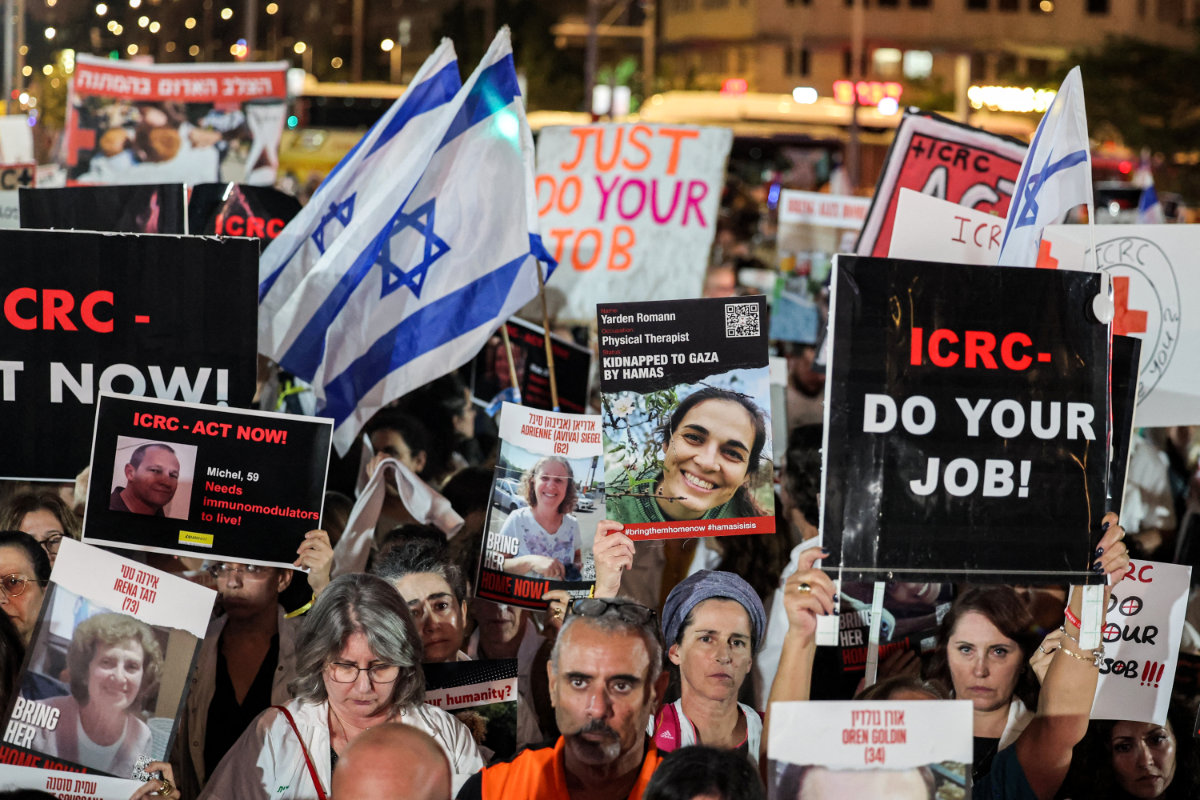
Meanwhile, according to him, humanitarians are running out of words to describe the misery that the Palestinian people are enduring in Gaza under Israel’s offensive. He underscored the urgency of de-escalation in Gaza, where Israel has been fighting the Palestinian militant group Hamas since Oct. 7 last year.
“There is an urgent need to de-escalate the level of violence,” he said. “What we see today in Gaza is unbearable.
“The civilian population, the Palestinian population, is going through a round of misery, which I have difficulty to even describe, because after seven months, eight months, I have the impression we used pretty much all the possible words to describe what they’re going through.
“I’m really concerned, because we don’t have words anymore. I’m afraid that at one stage, the situation of the Palestinian people in Gaza and including the hostages won’t be news anymore, because we are turning in circles, because we don’t see an improvement, because we see no end to this misery.”
Carboni added: “Every time I think about Gaza, I’m thinking about my Palestinian colleagues who are trapped in Gaza. “I’m thinking about their children, I’m thinking about their family, I’m thinking about the fact that they’ve been moved again.
“Most of them were coming from Gaza City. Then they moved to Khan Younis. Then they moved to Rafah. Now they are moving again. And I’m thinking about them.
“I’m thinking about, on the one hand, their courage, and on the other hand, this feeling of not being able to help them, not being able to alleviate their distress, their anxiety, their frustration.
“As a father, as a parent, I also connect with my colleagues who have children. It’s now, what, six, seven months that those children are living on a battlefield? Because Gaza is a very special situation. You’re permanently on the battlefield.
“You have children who, every day, are hearing bombs. Who’ve seen people being killed, wounded, children seeing their parents helpless.
“So, when I think about Gaza, I think about ICRC’s Palestinian staff, and it gives me the energy, humbles me, and at the same time makes me angry, because I don’t think my colleagues need to go through this.”
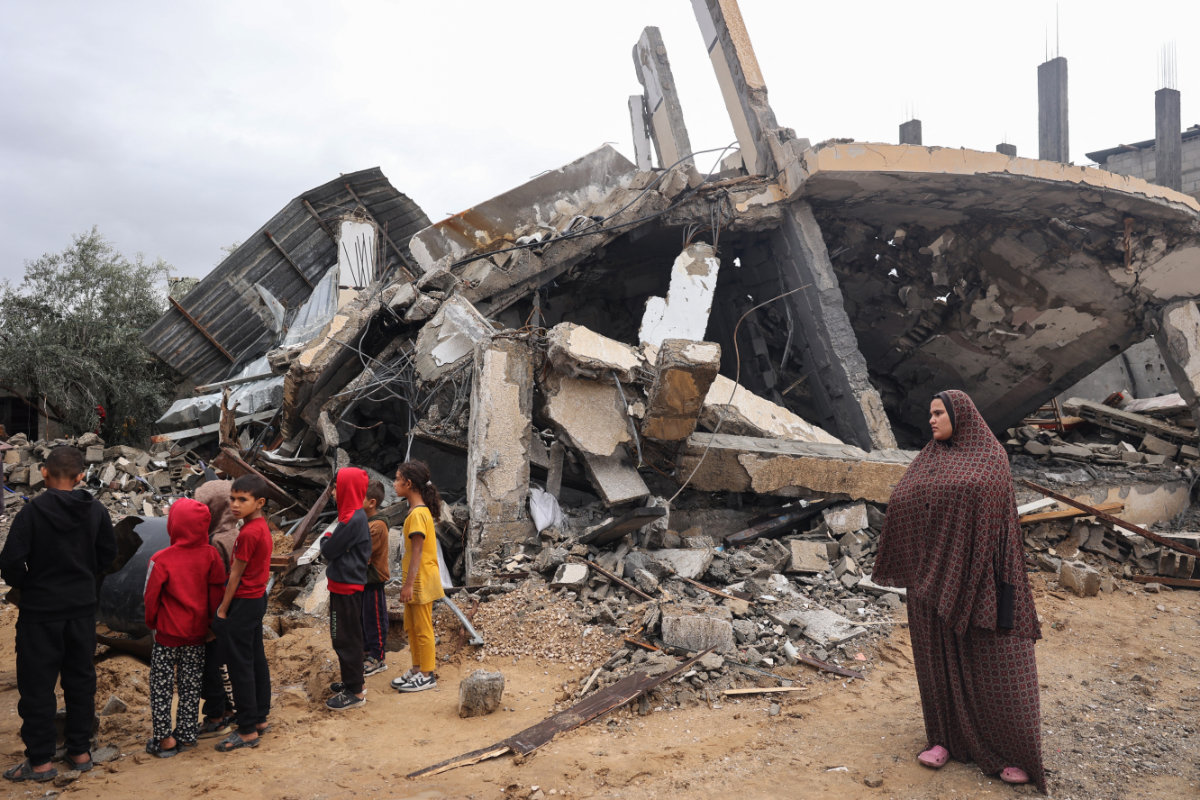
Asked whether he thought the worst is now over or if there was still potential for a wider regional conflagration emanating from Gaza, Carboni said the spillover has already occurred, raising fears of an unintended escalation.
“It’s not that we have to fear a regional conflict happening — it’s happening while we’re talking,” he said. “We have the fighting in Lebanon. We had this night where we had missiles and drones launched from Iran on Israel. The regional conflict is happening.”
Beyond its role as a humanitarian aid agency, Carboni said ICRC plays a critical role in conflict resolution, in the hope that “diplomacy will prevail, politics will prevail, and not the use of force.”
However, the violence in Gaza has had a detrimental effect on conflicts elsewhere in the region, including in Yemen, where the Iran-backed Houthi militia has been locked in battle with the UN-recognized Yemeni government since 2014.
Since the outbreak of fighting in Gaza, the Houthi militia has mounted attacks on commercial shipping in the Red Sea and Gulf of Aden, ostensibly in solidarity with Palestinians, prompting retaliatory strikes by the US and UK.
As a result, the ceasefire between the Houthis and the Yemeni government, which expired in October 2022 but has remained largely intact, has been cast into doubt. Carboni said a prisoner exchange deal could get the stalled process back on track.
“The crisis in Gaza shook all the conflicts in the region,” he said. “I see the authorities in Riyadh trying to nevertheless push for this permanent ceasefire and tomorrow a peace agreement. One of the measures which would facilitate, which would build confidence, is to continue the release of detainees.”
